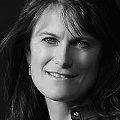Jacqueline Novogratz was a 25-year-old aid worker in Kigali, Rwanda, when she saw something that stopped her in her tracks - a young boy wearing a blue sweater with zebras and a mountain embroidered across the chest.
This wasn't just any sweater. It was HER sweater, a childhood favorite she had given away to an American charity 10 years earlier. Sure enough, when she stopped the boy, she found her name printed on the sweater's tag. "And I have kept that sweater and held it as metaphor for how interconnected we are in the world and how our action - and our inaction - can impact people we might never meet, never know, all around the world," she says. Bridging cultural, economic gaps Novogratz came to Rwanda by a circuitous path. The oldest of seven children in a military family, she grew up with a strong desire to serve others.
"With a dad in Vietnam, a family that talked about social justice, I was interested in the world, and I wanted somehow to be a bridge," she explains. With a degree in economics and international relations, Novogratz reviewed corporate financing in Latin America and later in West Africa tried to apply microfinancing to build businesses in low-income areas. But as she recalls in her memoir, The Blue Sweater , she realized the people she was trying to help wanted to solve their own problems.
"I learned that if we were going to make any change, we had to start by listening and not needing to be the leader, but learning how to support extraordinary leaders who exist," she says. Lessons from Rwanda Novogratz thought she had found a way to do that in Rwanda, where she partnered with six women to set up the country's first microfinance bank in 1987. She also worked with 20 unwed mothers to build a thriving bakery.
"I don't think I ever felt more alive than I did then," she recalls. Seven years later, back in the United States, Novogratz read with horror accounts of the 1994 Rwandan genocide, in which 800,000 Tutsis and moderate Hutus were killed. She realized the women she had worked with had played every conceivable role in the carnage - from victim, to bystander, to perpetrator.
"It was a time of having to confront that angels and monsters exist in every single one of us and that what we need in the world are systems that really bring out our better angels and suppress those monsters." A new kind of philanthropy Novogratz came up with a system she felt could do that. "I have seen that traditional approaches to charity and aid don't solve problems of poverty. In fact, too often the create dependence. And on the other hand, the markets alone don't solve problems of poverty. Too often they ignore the poor, don't see them at all." In 2001, Novogratz founded Acumen Fund, a non-profit global venture fund, which takes a long-term approach - what she calls "patient capitalism." "This idea that you can invest in extraordinary entrepreneurs that are trying to determine how to bring water, health care, housing, alternative energy to low-income people, not seeing them as passive recipients of charity, but as active consumers who want to make change in their own lives." Acumen Fund has invested about $40 million in 40 different business ventures in Pakistan, India, and East and South Africa.
Those investments include a bed net factory in Tanzania that employs 7,000 women and makes 20 million bed nets every year and a business that sells drip irrigation systems to smallholder farmers in India, allowing the average farmer to double or triple his income.
Moving forward - together Novogratz says she would like to see a greater focus on providing alternative energy to low-income people. "Finding solutions that bring affordable solar power, LED lights to low-income families can help them increase their productivity, increase their income and far improve their health." Jacqueline Novogratz says poverty can be alleviated by working with innovators around the world and empowering the poor to make their own decisions, treating them with dignity and respect. Despite the challenges facing the world, Novogratz insists we are well-prepared to face them together.
"I couldn't feel more optimistic about the path that the world has in front of it, if only we choose to take it."

